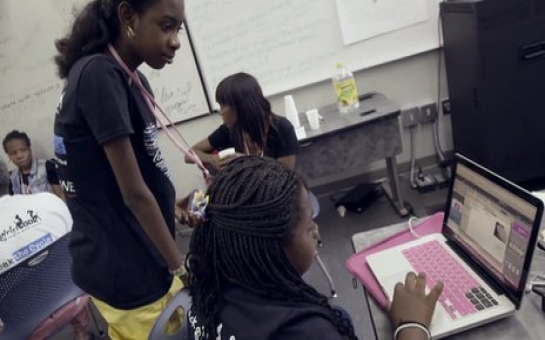Follow us !
Summer camps for coding
World
10:00 | 21.06.2014

Summer camps for coding
This is the year when teaching children how to code is really taking off and there are moves to make sure it is not just the children of the rich and the technocrats who learn this key skill.In England, come September coding will be made a mandatory subject for state-run primary schools and younger students in secondary schools.In the US, the organisation "Black Girls Code" is making moves to bridge a digital divide and give girls the skills they need to make it.'My language'Twelve-year-old Nia Johnson and her mother Stacey were up at six in the morning to make it to the Black Girls Code hackathon in Brooklyn, New York. They won't be home until after 10 at night.At the event girls come together to solve problems by building apps.Today Nia is creating a game called "Just Relax". The point of the game is to help the player control their temper when bad things happen to them.She is also working on a quiz about respect and abuse in relationships."It's very interesting because some people have a love for different languages. Coding is like my different language," she says."It's something different, that not a lot of people get the chance to learn about, but I'm grateful that I do."Donna Knut is one of the organisers of the event. She got involved after feeling intimated in computer classes where she was the only woman."To me it's really personal to help young girls understand that it's not intimidating," she says."You don't have to be scared to be a techie. And I think when they get that at that young age, as they progress, it's not as intimidating any more."The hackathon was just a two-day event but summer camps are springing up across the world, offering residential intensive learning for children as young as six.Lego and MinecraftSheineez Barber has been running FunTech in London and south east England since 1996, teaching children computing.Each year kids come from all over Europe to their summer schemes.Child-focused programmes include Lego robotics, 3D game design and one course which uses the popular game Minecraft to teach students to understand and virtually build the inside of a computer."Parents are quite surprised because we're not just childcare with a technology element - we have a properly academic approach so the children really do learn key skills," she says.Parents of the students have traditionally worked at technology companies like Microsoft, Pfizer and HP but as the importance of coding has become more widely acknowledged the backgrounds of the homes the children come from has also expanded.Ralph Dreischmeier is the global leader for technology at the Boston Consulting Group. He has sent three children to FunTech."Our kids will live very differently and the difference between their generation and mine will be much more radical than that between mine and my parents, so it's important they learn about technology in an exciting and interesting way."A week at FunTech's new residential course can be yours for £879 ($1,500) though scholarships are available.'They earn more than U2'It is not just in the UK - there are camps run by other companies this summer in cities including Singapore, Mumbai and of course, across the US, some of them costing up to $5,000.It is a price many consider worth paying. With the technology sector still growing fast the appetite and rewards for a good coder are huge."Companies are falling all over themselves to get the top talent. They know that a super productive, amazingly talented programmer is worth 1,000 times more than an average person, so they'll pay 1,000 times more," says Bruce Upbin, who manages the technology coverage for Forbes magazine."I've seen signing bonuses at Twitter and Facebook being thrown around for $100m in restricted shares. That's crazy. That's more than sports stars like LeBron James makes."These people are truly rock stars. They earn more than U2."Breaching the digital divideThe billionaires of tomorrow may inherit their wealth, some may go into businesses that their connections have helped them found, but if you can code you can make it without any of those benefits, says Mr Upbin."I mean, you can't just start a cable TV system right now but you can start an app like SnapChat or WhatsApp that gets to 100 million users," he says."All of a sudden Facebook is starting to talk to you, and offering you a check for 3 billion, 9 billion, and you're on your way."(BBC)Bakudaily.az










